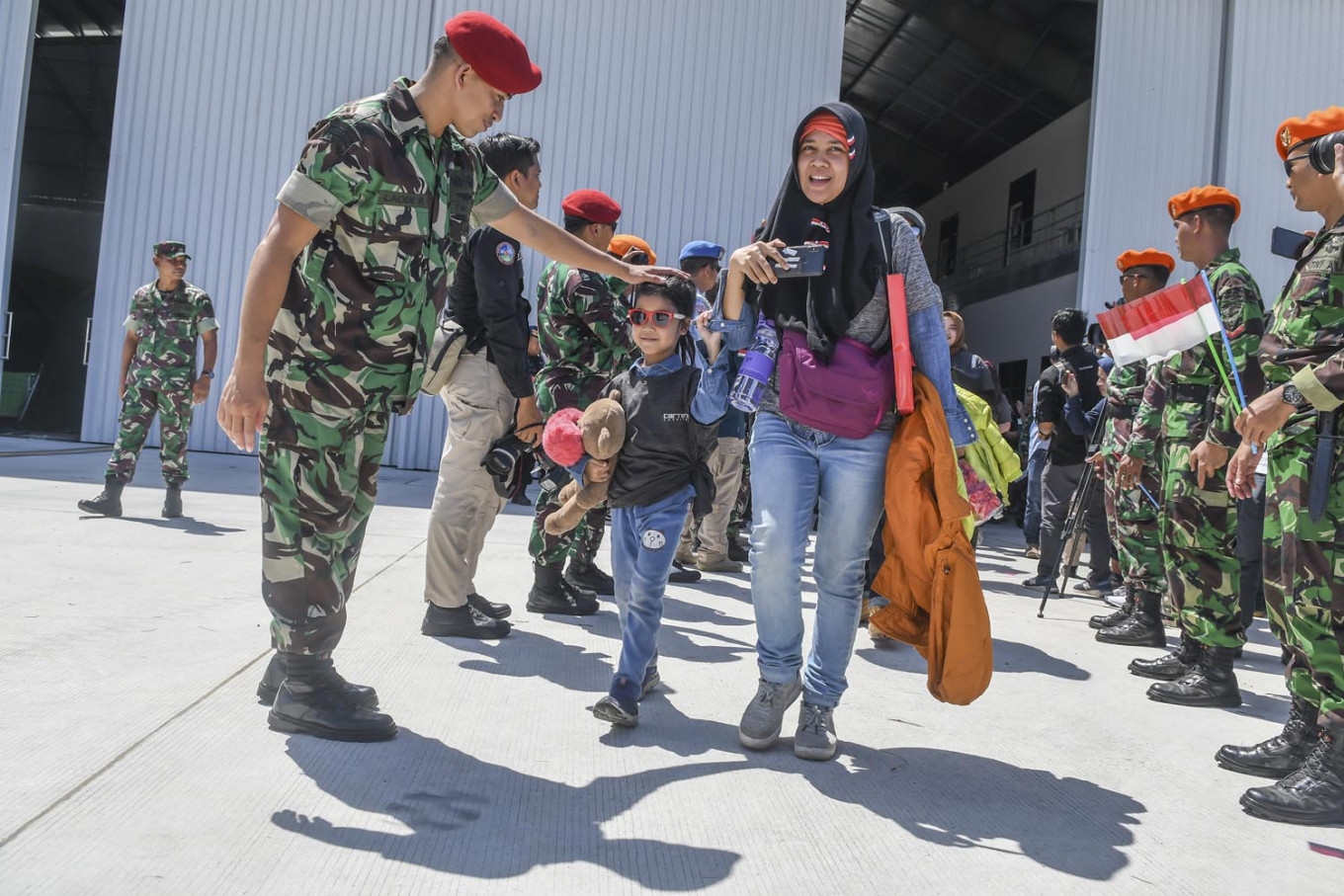Popular Reads
Top Results
Can't find what you're looking for?
View all search resultsPopular Reads
Top Results
Can't find what you're looking for?
View all search results‘We hope people won’t be afraid of us’: RI evacuees from Wuhan brace for uncertain future
Mila, one of the Indonesian students who was evacuated by the government from Wuhan, said that the deluge of misinformation regarding the coronavirus as well as the initial opposition of Natuna residents to hosting the quarantine had opened her eyes to the possibility that she and her fellow evacuees would be unfairly stigmatized.
Change text size
Gift Premium Articles
to Anyone
H
ilyatu Millati “Mila” Rusdiyah could finally breathe a sigh of relief when she was reunited with her family two weeks after her repatriation from Wuhan, the epicenter of the coronavirus outbreak in Hubei province, China.
Her family, she said, was what she had missed the most during the isolation period.
The 33-year-old student had returned from a special quarantine complex in Natuna regency, Riau Islands, where she was observed for symptoms of COVID-19, the illness resulting from the novel coronavirus, and isolated from contact with the outside world for 14 days in accordance with established procedure.
Mila was one of the Indonesian students evacuated by the government from Wuhan and the surrounding areas. She had lived there with her husband, fellow student Ahmad Syafuddin Zuhri. The mother of one had been pursuing a doctorate at Chongqing University in Chongqing, Sichuan province – about five hours away from Wuhan by train – while, her husband had been studying at the Central China Normal University in Wuhan.
She said the quarantine had been relatively comfortable, with the evacuees exercising every morning and filling their days with activities such as karaoke and games, amid routine medical examinations.
“We have all been given certificates of good health from the Health Ministry, and we hope people won’t be afraid of us,” Mila said.
She said that the deluge of misinformation regarding the coronavirus, as well as the initial opposition of Natuna residents to hosting the quarantine had opened her eyes to the possibility that she and her fellow evacuees could be unfairly stigmatized.
“We were met with resistance [from the public] during quarantine, so we have braced ourselves,” said the Central Java native.
Despite their less-than-favorable reception by residents of Natuna, Mila conveyed her appreciation of the government and other parties involved in the evacuation.
She said that she had chosen to remain in Wuhan when the viral outbreak first made headlines earlier this year because she was determined to finish her dissertation. However, things spiraled quickly as dozens of confirmed cases soon ballooned to thousands.
“We were so relieved when we found out that the Indonesian government would evacuate us,” Mila said.
Mila and her family had no choice but to wait for the evacuation team to arrive in Wuhan during the citywide lockdown. Over the course of 10 days, Mila said she had tried her best to share her experience on social media to counter pervasive misinformation about the outbreak. She said that one of the worst stories she read was one saying that the outbreak was azab (divine retribution).
“We were already stuck in a locked down city and worried enough as it was. Then netizens decided to say things like that. It made us feel down,” she said.
Khayun Nur Fajrin, the head of Malangan village in Klaten, Central Java, where Mila and her family reside, said he was optimistic that residents would welcome her with open arms despite the stigma against Indonesian evacuees from China.
“I have called [the Central Java Health Agency] and asked for their assistance should we need more guidance regarding this issue. But from what I’ve seen, the locals here seem to be welcoming, some of them even offered to visit Mila in her home today,” Khayun said.
Indonesian students returning from China in recent months have often been met with suspicion and prejudice in the archipelago, making them feel like outcasts in their own country.
Read also: Indonesian students treated as pariahs upon return from China
Adam Amrismafasyah, a 19-year-old Jiangsu Normal University student from Muaraenim regency in South Sumatra, said the locals had been treating him differently ever since he returned from China earlier this month.
“Some of my neighbors have steered clear of me, others asked me upfront whether I had been thoroughly examined and whether I was completely free of the coronavirus,” Adam told The Jakarta Post.
There have been no confirmed cases of COVID-19 in Indonesia to date. (rfa)










